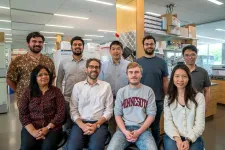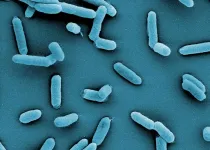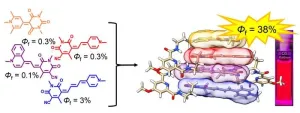(Press-News.org) The City University of New York has appointed Joshua C. Brumberg as president of the CUNY Graduate Center, making permanent a post he has held on an interim basis since October 2023. Brumberg, a neurobiologist who has been a faculty member, dean and researcher during his 22-year career at CUNY, will lead the University’s renowned center of graduate education, scholarship and public-interest research. CUNY’s Board of Trustees approved the appointment at its meeting last night.
“Dr. Brumberg has played a key role in expanding CUNY’s research enterprise over the past several years,” said Chancellor Félix V. Matos Rodríguez. “A scientist at heart, he is widely admired for his dedication to STEM education and commitment to CUNY’s missions of advancing equity and opportunity. Dr. Brumberg is the right person at the right time to lead the Graduate Center into the future.”
The Chancellor recommended Brumberg as the permanent leader after consulting with Graduate Center faculty, students, staff, foundation board members and administrators who expressed strong and unanimous support.
Working with Graduate Center faculty and staff as interim leader, Brumberg has helped attract nearly $90 million in external funding to support research and educational programming. Notable gifts during this period have included $75 million from the Simons Foundation to establish CUNY as a hub for computational science and support CUNY’s participation in Governor Kathy Hochul’s Empire AI initiative; and $10 million from the Leon Levy Foundation to endow the Leon Levy Center for Biography.
Brumberg previously served as the Graduate Center’s dean for the sciences. In that role for seven years, he oversaw research operations, along with 11 STEM doctoral programs and five master’s programs that were created during his tenure.
He also secured external funding for diversity programs in the laboratory sciences and gender equity in mathematics. He co-chaired subcommittees for strategic plan development and Middle States accreditation, and twice served as interim executive director of the Advanced Science Research Center (ASRC), an arm of the Graduate Center that opened on the campus of The City College of New York in 2014.
“It is an honor to serve the Graduate Center and The City University of New York, and I am humbled by the confidence the Chancellor and the CUNY trustees have placed in me to lead this great public graduate school,” said Brumberg. “During my time as interim president, we have made significant strides in attracting support from donors and funders. I look forward to continuing these efforts and to working with our remarkable faculty and students to build on the Graduate Center’s record of excellence in research and teaching.”
Brumberg earned his Ph.D. in neurobiology from the University of Pittsburgh and completed postdoctoral fellowships at Yale University and Columbia University. In 2002, he joined the faculty of Queens College’s Department of Psychology and started his own laboratory there, with simultaneous appointments in the biology, psychology and cognitive neuroscience programs at the Graduate Center. In devoting his career to CUNY and the Graduate Center, he has followed in the footsteps of his father, Professor Emeritus of Education Stephan Brumberg, who served on the Graduate Center faculty and held administrative positions at Brooklyn College and in CUNY’s Central Office.
As a neurobiologist, Brumberg has used behavioral, physiological and anatomical methods to study how environmental experience impacts the development and function of cortical circuits in the brain, the site of cognitive computations. He has published more than 60 papers and has received multiple grants from the National Science Foundation and the National Institutes of Health.
Brumberg is the 18th permanent campus leader installed by Chancellor Matos Rodríguez during his five-year tenure, a highly diverse group that includes 10 women, 11 leaders of color and CUNY’s first college presidents of Asian and South Asian descent.
The CUNY Graduate Center is one of the leading Ph.D.-granting institutions in the country, educating students of diverse backgrounds from all over the world and fostering groundbreaking research. With a campus in Midtown Manhattan and a science center in upper Manhattan, the school educates over 3,200 students enrolled in more than 30 doctoral programs and a growing number of master’s programs in cutting-edge fields. It encompasses more than 30 centers, institutes and initiatives and has a faculty of 130 with Graduate Center appointments in addition to more than 1,700 faculty from throughout CUNY.
The City University of New York is the nation’s largest urban public university, a transformative engine of social mobility that is a critical component of the lifeblood of New York City. Founded in 1847 as the nation’s first free public institution of higher education, CUNY today has seven community colleges, 11 senior colleges and seven graduate or professional institutions spread across New York City’s five boroughs, serving more than 225,000 undergraduate and graduate students and awarding 50,000 degrees each year. CUNY’s mix of quality and affordability propels almost six times as many low-income students into the middle class and beyond as all the Ivy League colleges combined. More than 80 percent of the University’s graduates stay in New York, contributing to all aspects of the city’s economic, civic and cultural life and diversifying the city’s workforce in every sector. CUNY’s graduates and faculty have received many prestigious honors, including 13 Nobel Prizes and 26 MacArthur Genius Grants. The University’s historic mission continues to this day: provide a first-rate public education to all students, regardless of means or background. To learn more about CUNY, visit https://www.cuny.edu.
END
Neurobiologist Joshua C. Brumberg named CUNY Graduate Center president
Brumberg, who was appointed interim president in October 2023 and who has served CUNY for 22 years, becomes the seventh permanent president of the Graduate Center
2024-06-26
ELSE PRESS RELEASES FROM THIS DATE:
Cell division: Before commitment, a very long engagement
2024-06-26
Before a cell commits fully to the process of dividing itself into two new cells, it may ensure the appropriateness of its commitment by staying for many hours—sometimes more than a day—in a reversible intermediate state, according to a discovery by researchers at Weill Cornell Medicine. Their revelation of this fundamental feature of biology includes details of its mechanisms and dynamics, which may inform the development of future therapies targeting cancers and other diseases.
In their study, published June 26 in Nature, the researchers developed new tools allowing them to track over time the activation state of E2F, a ...
New tool enables faster, more cost-effective genome editing of traits to improve agriculture sustainability
2024-06-26
ST. LOUIS, MO, June 26, 2024 – With the goal of reducing the time and cost it takes to bring an improved crop to the marketplace, research conducted in the laboratory of Keith Slotkin, PhD, and his colleagues in the Plant Transformation Facility at the Donald Danforth Plant Science Center, was recently published in the scientific journal Nature. The publication Transposase-assisted target site integration for efficient plant genome engineering focuses on technology called TATSI (Transposase-Assisted Target Site Integration), which uses transposable elements to integrate custom DNA into specific sites in plant genomes.
The ...
Unlocking the world of bacteria
2024-06-26
Bacteria populate virtually every habitat on Earth, including within and on our own bodies. Understanding and engineering bacteria can lead to new methods for diagnosing, treating, and preventing infections. Additionally, it presents opportunities to protect crops from disease and create sustainable cell factories for chemical production, reducing environmental impact — just a few of the many benefits to society. To unlock these advantages, scientists need the ability to manipulate the genetic content of these bacteria. However, a longstanding bottleneck in genetically engineering bacteria has been the efficient ...
Argonne to support new AI for science projects as part of the National AI Research Resource Pilot
2024-06-26
The U.S. Department of Energy’s (DOE) Argonne National Laboratory will support three innovative artificial intelligence (AI)-driven science projects as part of the first round of awards from the National Artificial Intelligence Research Resource (NAIRR) Pilot.
Led by the National Science Foundation (NSF) in collaboration with DOE and several partners, the NAIRR Pilot aims to provide researchers and students with expanded access to key AI resources and data. NAIRR’s ultimate goal ...
Stress testing pension funds: Lithuanian researchers lead global innovation
2024-06-26
“We wanted to investigate how second pillar pension funds react to financial crises and how to protect them from the crises,” says Kaunas University of Technology (KTU) professor Dr Audrius Kabašinskas, who, together with his team, discovered a way to achieve this goal. The discovery in question is the development of stress tests for pension funds. Lithuanian researchers were the first in the world to come up with such an adaptation of the stress tests.
Stress tests are usually carried out on banks or other financial institutions to allow market regulators to determine and assess their ability to withstand adverse economic conditions.
According to the professor at ...
Multivitamin use and mortality risk in 3 prospective US cohorts
2024-06-26
About The Study: Multivitamin use was not associated with a mortality benefit in this cohort study of U.S. adults. Still, many adults report using multivitamins to maintain or improve health.
Corresponding Author: To contact the corresponding author, Erikka Loftfield, Ph.D., M.P.H., email erikka.loftfield@nih.gov.
To access the embargoed study: Visit our For The Media website at this link https://media.jamanetwork.com/
(doi:10.1001/jamanetworkopen.2024.18729)
Editor’s Note: Please see the article for additional information, including other authors, author contributions and affiliations, conflict of interest and financial disclosures, ...
Solar technology: Innovative light-harvesting system works very efficiently
2024-06-26
In order to convert sunlight into electricity or other forms of energy as efficiently as possible, the very first step is an efficient light-harvesting system. Ideally, this should be panchromatic, i.e. absorb the entire spectrum of visible light.
The light-collecting antennae of plants and bacteria are a model for this. They capture a broad spectrum of light for photosynthesis, but are very complex in structure and require many different dyes to transmit the energy of the absorbed light and focus it on a central point.
The light-harvesting systems developed by humans to date also have disadvantages:
Although ...
Brain’s ‘escape switch’ controlled by threat sensitivity dial
2024-06-26
Neuroscientists have discovered how the brain bidirectionally controls sensitivity to threats to initiate and complete escape behaviour in mice. These findings could help unlock new directions for discovering therapies for anxiety and post-traumatic stress disorder (PTSD).
The study, published today in Current Biology, outlines how researchers at the Sainsbury Wellcome Centre at UCL studied a region of the brain called the periaqueductal gray (PAG), which is known to be hyperactive in people with anxiety and PTSD. Their ...
Improving prostate cancer screening for transgender women
2024-06-26
Transgender women are still at risk for prostate cancer. A new study led by Cedars-Sinai Cancer investigators, published in the peer-reviewed Journal of the American Medical Association, concludes that current screening guidelines could miss early-stage prostate cancer in transgender women on hormone therapy.
The prostate, a small gland that helps make semen, also produces a protein called prostate-specific antigen, or PSA. Blood levels of PSA tend to be elevated in people who have prostate cancer, and the PSA test, which measures those levels, is a common prostate ...
For healthy adults, taking multivitamins daily is not associated with a lower risk of death
2024-06-26
What: A large analysis of data from nearly 400,000 healthy U.S. adults followed for more than 20 years has found no association between regular multivitamin use and lower risk of death. The study, led by researchers at the National Institutes of Health’s National Cancer Institute, was published June 26, 2024, in JAMA Network Open.
Many adults in the United States take multivitamins with the hope of improving their health. However, the benefits and harms of regular multivitamin use remain unclear. ...
LAST 30 PRESS RELEASES:
Asteroid samples offer new insights into conditions when the solar system formed
Fecal transplants from older mice significantly improve ovarian function and fertility in younger mice
Delight for diastereomer production: A novel strategy for organic chemistry
Permafrost is key to carbon storage. That makes northern wildfires even more dangerous
Hairdressers could be a secret weapon in tackling climate change, new research finds
Genetic risk for mental illness is far less disorder-specific than clinicians have assumed, massive Swedish study reveals
A therapeutic target that would curb the spread of coronaviruses has been identified
Modern twist on wildfire management methods found also to have a bonus feature that protects water supplies
AI enables defect-aware prediction of metal 3D-printed part quality
Miniscule fossil discovery reveals fresh clues into the evolution of the earliest-known relative of all primates
World Water Day 2026: Applied Microbiology International to hold Gender Equality and Water webinar
The unprecedented transformation in energy: The Third Energy Revolution toward carbon neutrality
Building on the far side: AI analysis suggests sturdier foundation for future lunar bases
Far-field superresolution imaging via k-space superoscillation
10 Years, 70% shift: Wastewater upgrades quietly transform river microbiomes
Why does chronic back pain make everyday sounds feel harsher? Brain imaging study points to a treatable cause
Video messaging effectiveness depends on quality of streaming experience, research shows
Introducing the “bloom” cycle, or why plants are not stupid
The Lancet Oncology: Breast cancer remains the most common cancer among women worldwide, with annual cases expected to reach over 3.5 million by 2050
Improve education and transitional support for autistic people to prevent death by suicide, say experts
GLP-1 drugs like Ozempic could cut risk of major heart complications after heart attack, study finds
Study finds Earth may have twice as many vertebrate species as previously thought
NYU Langone orthopedic surgeons present latest clinical findings and research at AAOS 2026
New journal highlights how artificial intelligence can help solve global environmental crises
Study identifies three diverging global AI pathways shaping the future of technology and governance
Machine learning advances non targeted detection of environmental pollutants
ACP advises all adults 75 or older get a protein subunit RSV vaccine
New study finds earliest evidence of big land predators hunting plant-eaters
Newer groundwater associated with higher risk of Parkinson’s disease
New study identifies growth hormone receptor as possible target to improve lung cancer treatment
[Press-News.org] Neurobiologist Joshua C. Brumberg named CUNY Graduate Center presidentBrumberg, who was appointed interim president in October 2023 and who has served CUNY for 22 years, becomes the seventh permanent president of the Graduate Center







